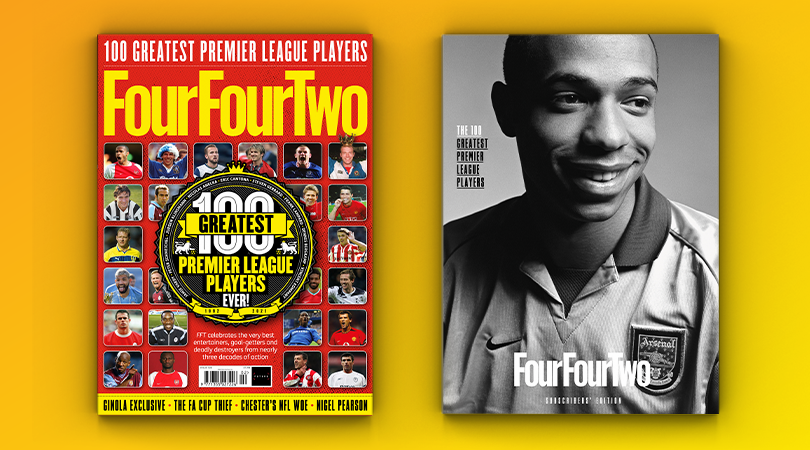Liverpool have had to abandon their transfer strategy in signing Ben Davies and Ozan Kabak - but both moves make sense
Liverpool have exercised patience and pragmatism in the transfer market under Klopp in previous windows, but their desperate defensive acquisitions were necessary

The best features, fun and footballing quizzes, straight to your inbox every week.
You are now subscribed
Your newsletter sign-up was successful
Want to add more newsletters?

Five times a week
FourFourTwo Daily
Fantastic football content straight to your inbox! From the latest transfer news, quizzes, videos, features and interviews with the biggest names in the game, plus lots more.

Once a week
...And it’s LIVE!
Sign up to our FREE live football newsletter, tracking all of the biggest games available to watch on the device of your choice. Never miss a kick-off!
Join the club
Get full access to premium articles, exclusive features and a growing list of member rewards.
It was a policy that propelled Liverpool to the top of the European and English games. No compromise.
Jurgen Klopp landed his top transfer targets or no one. He would wait for them, even if it may cost Liverpool silverware in the short term. It was a strategy that nevertheless proved a spectacular success. It brought Virgil van Dijk and Alisson. Each has a claim to be the best in the world in his position. It is harder to imagine such claims would be made on behalf of whoever figured further down the respective goalkeeping and defensive shortlists.
Even when his buys have not yielded such a reward, there has been a similar thought process. Liverpool were so determined to get Naby Keita they let him stay at RB Leipzig for a further year. Their attitude was the antidote to past errors, to the summer they spent scrabbling around looking for a striker, when Brendan Rodgers “categorically” ruled out bidding for Mario Balotelli and they ended up buying the self-same Mario Balotelli.

And yet here Liverpool are with a compromise choice now. Two, even. And they make perfect sense. Their situation has called for a common-sense compromise and their names are Ozan Kabak and Ben Davies. Kabak, on a loan deal, represents a chance to try before they buy. Davies is the permanent signing who may not prove that permanent. He will not have the same impact as Van Dijk. Klopp has not spent years pursuing him; indeed, as he admitted, Liverpool would not normally look at Preston players at all.In a few months, Davies may be found at another club. His Liverpool career is likely to encompass fewer than 20 appearances; quite possibly, the eventual number will be in single figures.
But he is a fit, available centre-back, with the bonus of being left-sided, and he is cheap. A £30 million compromise buy could have the knock-on effect of denting future transfer plans, denying Liverpool the funds they had earmarked for a prime target. They have not mortgaged their future for the next four months. Like Kabak’s £1 million loan fee, Davies’ £1.6 million purchase price, a discounted sum because his Preston contract was due to expire in the summer, and presumably reasonable wages, means he barely alters the financial equation. Indeed, a 25-year-old who has his admirers elsewhere has the potential to produce a profit.
Before then, they will be parachuted in for a short-term task; to alleviate the shortage of centre-backs and to offer more options, to render Joel Matip’s absence for the rest of the season a little less important. They should allow Jordan Henderson to return to midfield more often; though, with Matip out, probably not Fabinho as the Brazilian has deputised so adeptly in defence that he can probably be regarded as Liverpool’s first-choice centre-back this season.
Kabak will presumably be ahead of Davies in the pecking order, behind Fabinho in the pecking order but ensuring Rhys Williams, whose initially promising displays gave way to awkward outings in the FA Cup against Aston Villa’s youngsters and Manchester United’s senior side, and the teenager Billy Koumetio are not overexposed for now. Nat Phillips has acquitted himself well twice against West Ham, plus in the second half against Tottenham. He has Bundesliga experience, but his first-team career does not yet span 30 games; Davies’ includes 250. He is a seasoned centre-back. Kabak falls in between the two; time he will tell if he is an example of Liverpool’s long-termism. Davies probably is not.
The best features, fun and footballing quizzes, straight to your inbox every week.
There are echoes of Ragnar Klavan, a decent back-up who cost Liverpool little, never looked high class but rarely let them down and who became surplus to requirements after Van Dijk joined. So, too, of Steven Caulker, Klopp’s forgotten first signing, whose debut came in a cameo in attack but who ultimately did not dent their budget or alter their long-term plans.
Now, at a point when Liverpool have either been in a defensive injury crisis or one setback away from one, when a top-four finish cannot be guaranteed and a second successive league title cannot be ruled out, the case for Davies or a Davies-type signing has mounted. And Liverpool have proof that compromising can work: but for the Covid-19 crunch on their finances, they probably would have signed Timo Werner. Instead, Diogo Jota has been their attacking signing. But the Portuguese is a sign that second choice is not always second best. Even if it runs contrary to Liverpool’s recent ethos.
NOW READ
LIVERPOOL Pain, poverty, bribery and glory: the extraordinary rise of Roberto Firmino
CURLETT CUP Liverpool's greatest trophy you've never heard of
Richard Jolly also writes for the National, the Guardian, the Observer, the Straits Times, the Independent, Sporting Life, Football 365 and the Blizzard. He has written for the FourFourTwo website since 2018 and for the magazine in the 1990s and the 2020s, but not in between. He has covered 1500+ games and remembers a disturbing number of the 0-0 draws.
 Join The Club
Join The Club











